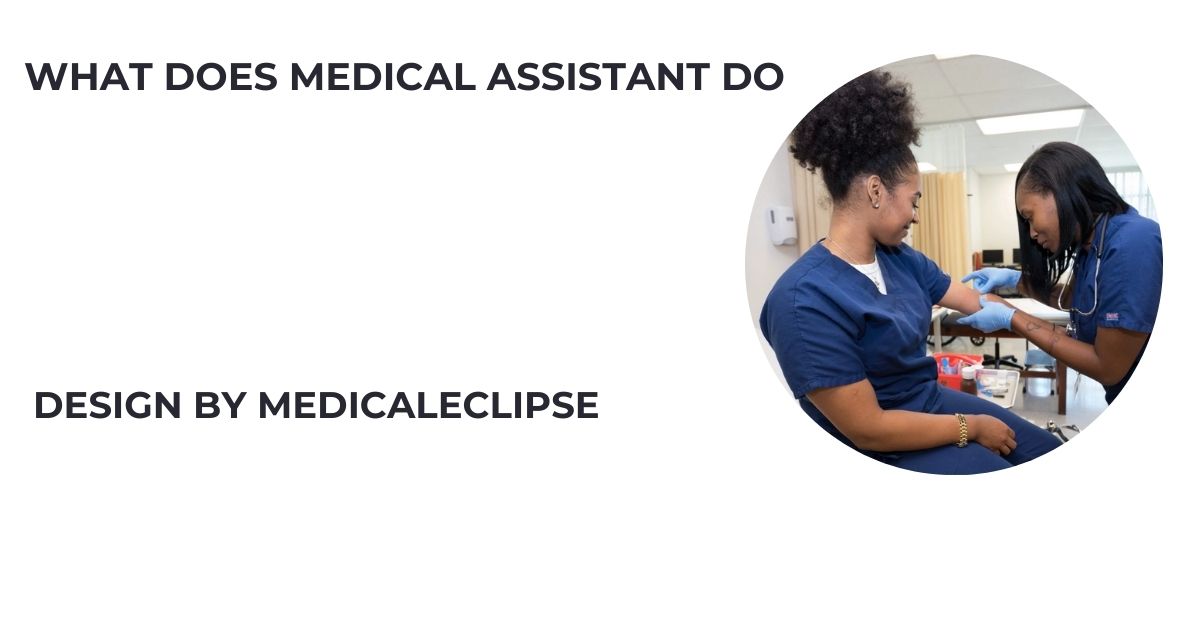Medical assistants perform a mix of administrative and clinical tasks, ensuring smooth healthcare operations and supporting patient care. Their diverse roles range from scheduling appointments to assisting in medical procedures.
In this article, we will dive into the fascinating world of medical assistants, exploring their diverse roles, responsibilities, and impact on healthcare.
Key Responsibilities of a Medical Assistant:

Medical assistants’ tasks can be broadly categorized into administrative and clinical responsibilities, with specific duties varying depending on the healthcare facility and state regulations.
Administrative Responsibilities:
Medical assistants manage essential front-office tasks to ensure seamless operations in healthcare settings. These include:
- Patient Scheduling: Organizing appointments and managing calendars to reduce wait times and improve patient flow.
- Record Keeping: Maintaining and updating accurate patient records, including medical histories and insurance information.
- Insurance Processing: Handling billing and claims to ensure smooth communication between patients and insurance providers.
- Communication Management: Answering phone calls, responding to patient inquiries, and relaying messages to doctors and nurses.
- Office Coordination: Ensuring medical supplies are stocked, equipment is maintained, and the office runs efficiently.
These tasks form the backbone of any medical practice, allowing healthcare providers to focus on patient care.
Clinical Responsibilities:
Medical assistants also perform hands-on tasks to support patient care, including:
- Vital Signs Monitoring: Measuring blood pressure, pulse, temperature, and respiratory rates to assist doctors in assessments.
- Patient Preparation: Guiding patients to examination rooms, explaining procedures, and ensuring they are comfortable.
- Assisting During Procedures: Providing support during medical exams, minor surgeries, and other procedures by handing tools and maintaining a sterile environment.
- Specimen Collection: Collecting blood, urine, or other samples for laboratory testing.
- Medication Administration: Administering vaccines, injections, or medications as directed by healthcare providers.
These clinical duties vary by state and healthcare setting, but they are essential in providing comprehensive patient care.
Work Environments for Medical Assistants:
Medical assistants work in diverse healthcare settings, each offering unique challenges and opportunities:
- Hospitals: Supporting outpatient services, emergency care, or specialty departments.
- Private Practices: Assisting general practitioners or specialists, such as dermatologists or cardiologists.
- Urgent Care Centers: Providing immediate care for non-life-threatening illnesses and injuries.
- Long-Term Care Facilities: Helping manage care for elderly or chronically ill patients.
- Specialty Clinics: Focusing on areas like pediatrics, orthopedics, or oncology.
Each environment demands adaptability and a broad skill set, making medical assistants versatile professionals.
Essential Skills and Qualifications:

To thrive as a medical assistant, individuals need a combination of education, technical proficiency, and interpersonal skills.
Educational Requirements:
- Completion of a medical assisting diploma, certificate, or associate degree program.
- Coursework typically includes anatomy, medical terminology, pharmacology, and clinical procedures.
Certifications:
- While not mandatory in all states, certifications like the Certified Medical Assistant (CMA) or Registered Medical Assistant (RMA) are highly valued by employers.
- Additional certifications in phlebotomy, EKG, or specialized fields can enhance career opportunities.
Key Skills:
- Technical Proficiency: Mastery of electronic health records (EHR) systems, medical equipment, and clinical procedures.
- Communication: Clear and empathetic communication with patients, families, and healthcare teams.
- Organization: Efficient multitasking to manage administrative and clinical duties simultaneously.
- Attention to Detail: Ensuring accurate documentation and adherence to medical protocols.
- Empathy and Patience: Building trust and providing comfort to patients, especially during stressful situations.
Also Read: What Is My Medical Record Number Sharp Rees Stealy – Accessing Your MRN at Sharp Rees-Stealy!
Why Are Medical Assistants Important?
Medical assistants are indispensable to the healthcare ecosystem. Here’s why their role is so critical:
- Enhanced Patient Care: They provide emotional support and ensure patients feel heard and cared for during visits.
- Operational Efficiency: By handling administrative tasks, medical assistants free up doctors and nurses to focus on direct patient care.
- Accurate Documentation: They maintain up-to-date patient records, reducing errors and ensuring smooth communication among healthcare teams.
- Faster Treatment: Their involvement in clinical tasks, such as taking vitals and preparing patients, streamlines the workflow and reduces wait times.
Career Growth and Opportunities:

Medical assisting offers numerous opportunities for advancement:
- Specialization: Medical assistants can specialize in fields like cardiology, dermatology, or obstetrics for higher earning potential and job satisfaction.
- Further Education: Many medical assistants advance their careers by pursuing nursing, healthcare administration, or other medical degrees.
- Job Stability: With healthcare demand continuously rising, medical assistants enjoy strong job security and competitive salaries.
Challenges Faced by Medical Assistants:
While the role of a medical assistant is rewarding, it comes with its own set of challenges:
- High Stress Levels: Balancing administrative and clinical tasks in fast-paced environments can be demanding.
- Physical Demands: Medical assistants are often on their feet for long hours, assisting patients and managing tasks.
- Emotional Strain: Interacting with patients who are anxious, in pain, or dealing with difficult diagnoses can be emotionally taxing.
- Continuous Learning: Keeping up with new medical technologies, procedures, and protocols requires ongoing education and adaptability.
Despite these challenges, medical assistants play a vital role in healthcare and find the profession deeply fulfilling.
Technology and Medical Assistants:
The integration of technology in healthcare has significantly impacted the role of medical assistants:
- Electronic Health Records (EHR): Medical assistants manage and update digital patient records, improving accuracy and accessibility.
- Telemedicine Support: Assisting in virtual consultations by managing technology, scheduling, and ensuring seamless communication between patients and providers.
- Diagnostic Tools: Operating and maintaining advanced medical equipment for procedures like EKGs or imaging tests.
- Online Patient Portals: Helping patients navigate online systems to access their medical records, test results, and appointment schedules.
Embracing technology allows medical assistants to enhance patient care and streamline healthcare processes.
FAQ’s
1. What is the primary role of a medical assistant?
Medical assistants handle both administrative and clinical tasks to ensure efficient healthcare delivery and support patient care.
2. Where do medical assistants work?
They work in hospitals, private practices, urgent care centers, long-term care facilities, and specialty clinics.
3. What skills are required for medical assistants?
Key skills include communication, organization, technical proficiency, attention to detail, and empathy.
4. Do medical assistants need certification?
While not mandatory in all states, certifications like CMA or RMA are highly valued and enhance career prospects.
5. How do medical assistants contribute to patient care?
They assist with vital signs, patient preparation, record-keeping, and supporting medical procedures to streamline care and improve patient experiences.
Conclusion
Medical assistants are the backbone of efficient healthcare delivery, balancing administrative tasks with hands-on patient care. Whether working in hospitals, clinics, or specialty practices, their contributions ensure smooth operations and excellent patient experiences. If you’re considering a career in healthcare, becoming a medical assistant is a rewarding path filled with opportunities for growth and meaningful work.

Leave a Reply